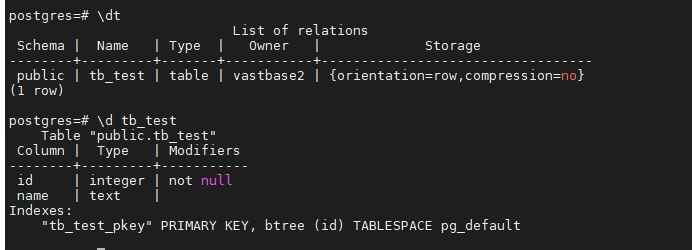连接数据库测试
本例中展示的为本地连接数据库,如远程连接,需要修改配置文件pg_hba.conf或postgresql.conf以完成远程连接数据库的配置。
连接数据库
以下Python代码显示如何连接到现有的数据库,并返回一个数据库对象。
# shell
vim connect.py
# python
#!/usr/bin/python3
import os
import sys
import psycopg2
def connectVastbase():
#连接数据库
conn = psycopg2.connect(database="postgres", user="vastbase2", password="Aa@123456", host="127.0.0.1", port="5432")
print('connect successful!')
if __name__=='__main__':
connectVastbase()
# shell
python3 connect.py
脚本成功执行输出如下:
[vastbase2@CentOS76-08 testcode]$ python3 connect.py
NOTICE: Last successful login info
login time:2021-08-10 06:30:57
application name:vb_ctl
Ip address:localhost
method:Trust
Failed 0 times since last successful login
connect successful!
创建表
以下Python程序将用于在之前连接的数据库Vastbase G100中创建一个表:
# shell
vim createtbl.pl
# python
#!/usr/bin/python3
import os
import sys
import psycopg2
def connectVastbase():
#连接数据库
conn = psycopg2.connect(database="postgres", user="vastbase2", password="Aa@123456", host="127.0.0.1", port="25432")
print('connect successful!')
#创建表
cursor = conn.cursor()
cursor.execute("drop table if exists tb_test")
cursor.execute("create table tb_test(id integer not null primary key, name text)")
conn.commit()
print('create table successful!')
if __name__=='__main__':
connectVastbase()
# shell
python3 createtbl.py
执行上述程序后,它将在Vastbase G100中创建一张tb_test表:

[vastbase2@CentOS76-08 testcode]$ python3 createtbl.py
NOTICE: Last successful login info
login time:2021-08-10 06:36:58
application name:gs_clean
Ip address:localhost
method:Trust
Failed 0 times since last successful login
connect successful!
create table successful!
INSERT操作
以下Python程序显示了如何在上述示例中创建的tb_test表中创建/插入记录:
# shell
vim insert.py
# perl
#!/usr/bin/python3
import os
import sys
import psycopg2
def connectVastbase():
# 连接数据库
conn = psycopg2.connect(database="postgres", user="vastbase2", password="Aa@123456", host="127.0.0.1", port="25432")
print('connect successful!')
# 插入数据
cursor = conn.cursor()
cursor.execute("insert into tb_test(id, name) values(1, 'Anna')")
name = 'Jack'
cursor.execute("insert into tb_test(id, name) values(%s, '%s')" %(2, name))
conn.commit()
print('insert successful!')
conn.close()
if __name__=='__main__':
connectVastbase()
# shell
python3 insert.py
执行以上程序后,它将在tb_test表中插入给定的记录:

[vastbase2@CentOS76-08 testcode]$ python3 insert.py
NOTICE: Last successful login info
login time:2021-08-10 06:46:58
application name:gs_clean
Ip address:localhost
method:Trust
Failed 0 times since last successful login
connect successful!
insert successful!
SELECT操作
以下Python程序显示了如何从上述示例中创建的tb_test表中获取和显示记录:
# shell
vim select.py
# perl
#!/usr/bin/python3
import os
import sys
import psycopg2
def connectVastbase():
# 连接数据库
conn = psycopg2.connect(database="postgres", user="vastbase2", password="Aa@123456", host="127.0.0.1", port="25432")
print('connect successful!')
# 查询数据
cursor = conn.cursor()
cursor.execute("select * from tb_test")
# fetchall
records = cursor.fetchall()
for record in records:
print('fetchall: id = ' + str(record[0]) + ', name = ' + str(record[1]))
# fetchone
cursor.execute("select * from tb_test")
record = cursor.fetchone()
print('fetchone: id = ' + str(record[0]) + ', name = ' + str(record[1]))
conn.close()
if __name__=='__main__':
connectVastbase()
# shell
python3 select.py
脚本成功执行输出如下:
[vastbase2@CentOS76-08 testcode]$ python3 select.py
NOTICE: Last successful login info
login time:2021-08-10 06:51:59
application name:gs_clean
Ip address:localhost
method:Trust
Failed 0 times since last successful login
connect successful!
fetchall: id = 1, name = Anna
fetchall: id = 2, name = Jack
fetchone: id = 1, name = Anna
UPDATE操作
Python代码显示了如何使用UPDATE语句来更新指定记录,然后从tb_test表中获取和显示更新的记录:
# shell
vim update.pl
# perl
#!/usr/bin/python3
import os
import sys
import psycopg2
def connectVastbase():
#连接数据库
conn = psycopg2.connect(database="postgres", user="vastbase2", password="Aa@123456", host="127.0.0.1", port="25432")
print('connect successful!')
cursor = conn.cursor()
#更新数据
cursor.execute("update tb_test set name = '%s' where id = %s" %('Elsa', 1))
print('update successful!')
conn.commit()
cursor.execute("select * from tb_test")
records = cursor.fetchall()
for record in records:
print('after update: id = ' + str(record[0]) + ', name = ' + str(record[1]))
conn.close()
if __name__=='__main__':
connectVastbase()
# shell
perl update.pl
脚本成功执行输出如下:
[vastbase2@CentOS76-08 testcode]$ python3 update.py
NOTICE: Last successful login info
login time:2021-08-10 06:56:59
application name:gs_clean
Ip address:localhost
method:Trust
Failed 0 times since last successful login
connect successful!
update successful!
after update: id = 2, name = Jack
after update: id = 1, name = Elsa
DELETE操作
Python代码显示了如何使用DELETE语句删除指定记录,然后从tb_test表中获取并显示剩余的记录:
# shell
vim delete.pl
# perl
#!/usr/bin/python3
import os
import sys
import psycopg2
def connectVastbase():
# 连接数据库
conn = psycopg2.connect(database="postgres", user="vastbase2", password="Aa@123456", host="127.0.0.1", port="25432")
print('connect successful!')
cursor = conn.cursor()
# 删除数据
cursor.execute("delete from tb_test where id = 2")
conn.commit()
print('delete successful!')
cursor.execute("select * from tb_test")
records = cursor.fetchall()
for record in records:
print('after delete: id = ' + str(record[0]) + ', name = ' + str(record[1]))
conn.close()
if __name__=='__main__':
connectVastbase()
# shell
python3 delete.py
脚本成功执行输出如下:
[vastbase2@CentOS76-08 testcode]$ python3 delete.py
NOTICE: Last successful login info
login time:2021-08-10 07:03:36
application name:
Ip address:localhost
method:SHA256
Failed 0 times since last successful login
connect successful!
delete successful!
after delete: id = 1, name = Elsa





